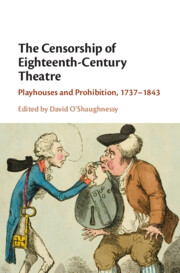Book contents
- The Censorship of Eighteenth-Century Theatre
- The Censorship of Eighteenth-Century Theatre
- Copyright page
- Dedication
- Contents
- Figures
- Contributors
- Acknowledgements
- Abbreviations
- Introduction
- Part I Gender
- Part II Politics
- Part III Performance
- Chapter 7 The Censorship of Personal Satire on the Eighteenth-Century Stage
- Chapter 8 Censoring the Unseen
- Chapter 9 Evading Censorship through Comedy, Improvisation, and Non-verbal Performance in the Early Nineteenth Century
- Chapter 10 Censoring Regency Flash
- Bibliography
- Index
Chapter 10 - Censoring Regency Flash
The Melodrama of the Weare–Thurtell Murder Case, 1823–4
from Part III - Performance
Published online by Cambridge University Press: 03 August 2023
- The Censorship of Eighteenth-Century Theatre
- The Censorship of Eighteenth-Century Theatre
- Copyright page
- Dedication
- Contents
- Figures
- Contributors
- Acknowledgements
- Abbreviations
- Introduction
- Part I Gender
- Part II Politics
- Part III Performance
- Chapter 7 The Censorship of Personal Satire on the Eighteenth-Century Stage
- Chapter 8 Censoring the Unseen
- Chapter 9 Evading Censorship through Comedy, Improvisation, and Non-verbal Performance in the Early Nineteenth Century
- Chapter 10 Censoring Regency Flash
- Bibliography
- Index
Summary
In late 1823- early 1824 London society was agog at news of a brutal murder that took place just north of the metropolis in Hertfordshire. A professional gambler, William Weare, was killed by John Thurtell and his accomplices Joseph Hunt and William Probert, all denizens of the ‘flash’ underworld that was the subject of Pierce Egan’s outstandingly successful book and play, Life in London (1821). The minor theatres of the Surrey and the Royal Coburg, the latter only recently opened in 1818, sought to capitalise on the sensational case by putting on melodramas in the weeks following news of the murder breaking in the London press in late October 1823. These plays were subject to censorship, unusually not by the authorities, but by legal intervention on the behalf of the accused John Thurtell on the grounds that the virtual re-enactment of the murder (including the appearance of the actual carriage or gig used to transport Weare to his death) would prejudice his trial in February 1824. The fate of these dramas thus represents a new perspective on the history of the censorship of the theatre, as well as offering insights into the intersections of theatre, scandalous celebrity, the metropolitan ‘flash’, print publicity, and the genre of melodrama in the formative decade of the 1820s.
Keywords
- Type
- Chapter
- Information
- The Censorship of Eighteenth-Century TheatrePlayhouses and Prohibition, 1737–1843, pp. 219 - 240Publisher: Cambridge University PressPrint publication year: 2023



